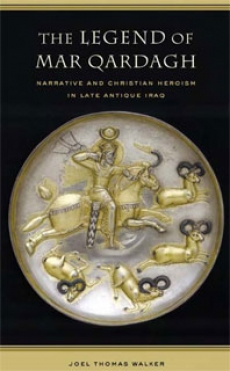
The Legend of Mar Qardagh: Narrative and Christian Heroism in Late Antique Iraq
The Syriac Christian legend that lies at the heart of this book was composed during the final decades of the Sasanian Empire, which spanned the period 224–642. Its anonymous author was probably a contemporary of the late Sasanian ruler, Khusro II (590–628). The legend’s hero, Mar (i.e., “Saint”) Qardagh, was believed to have lived some two hundred and fifty years earlier, during the reign of Shapur II (309–379), who appointed Mar Qardagh to serve as the viceroy and margrave (pa•1nê1 and marzb1n) of the region extending from the frontier city of Nisibis to the Diyala River in central Iraq. While the story of Mar Qardagh’s “heroic deeds” preserves few, if any, reliable details about the fourth century, the legend presents an extraordinary window into the cultural world of seventh-century Iraq. To adapt a phrase from Freya Stark, the story of Mar Qardagh enables one to “breathe” the climate of northern Iraq on the eve of the Islamic conquest.1 Translated from Syriac into English here for the first time, the History of Mar Qardagh presents a hero of epic proportions, whose characteristics confound simple classification. During the several stages of his career, Qardagh hunts like a Persian king, argues like a Greek philosopher, and renounces his Zoroastrian family to live with monks high in the mountains west of Lake Urmiye. His heroism thus encompasses and combines cultural traditions that modern scholars typically study in isolation. Taking the Qardagh legend as its foundation, this book explores the articulation and convergence of these diverse traditions in the Christian culture of the late Sasanian Empire...
Contents
acknowledgments / xi
abbreviations / xiii
transliteration and terminology / xvii
Introduction: Christianity in Late Antique Iraq and the Legend of Mar Qardagh / 1
part I. The History of Mar Qardagh (in English Translation, with Commentary)
Introduction to the Text / 17
The History of the Heroic Deeds of Mar Qardagh the Victorious Martyr / 19
Index of Scriptural Citations / 71
part II. Narrative and Christian Heroism in Late Antique Iraq
1. The Church of the East and the Hagiography of the Persian Martyrs / 87
2. “We Rejoice in Your Heroic Deeds!” Christian Heroism and Sasanian Epic Tradition / 121
3. Refuting the Eternity of the Stars: Philosophy between Byzantium and Late Antique Iraq / 164
4. Conversion and the Family in the Acts of the Persian Martyrs / 206
5. Remembering Mar Qardagh: The Origins and Evolution of an East-Syrian Martyr Cult / 246
Epilogue: The Festival of Mar Qardagh at Melqi / 281
appendix. the qardagh legend and the chronicle of arbela / 287
select bibliography / 291
index / 335
maps follow page 2
figures follow page 73
The Legend of Mar Qardagh
Narrative and Christian Heroism
in Late Antique Iraq
Joel Thomas Walker
UNIVERSITY OF CALIFORNIA PRESS
Berkeley / Los Angeles / London
University of California Press, one of the most distinguished
university presses in the United States, enriches lives around the
world by advancing scholarship in the humanities, social sciences,
and natural sciences. Its activities are supported by the UC Press
Foundation and by philanthropic contributions from individuals
and institutions. For more information, visit www.ucpress.edu.
University of California Press
Berkeley and Los Angeles, California
University of California Press, Ltd.
London, England
© 2006 by The Regents of the University of California
Library of Congress Cataloging-in-Publication Data
Walker, Joel Thomas, 1968–.
The legend of Mar Qardagh : narrative and Christian heroism in late antique Iraq / Joel Thomas Walker.
p. cm. (The transformation of the classical heritage ; 40)
Includes bibliographical references and index.
isbn 0-520-24578-4 (hardcover : alk. paper)
1. Qardagh, Mar. 2. Tash'ita de-Mar tardagh sahda.
3. Nestorian Church—Iraq—History. 4. Iraq—Church
history. I. Tash'ita de-Mar tardagh sahda. II. Title.
III. Series.
bx159.q37w35 2006
275.67'02'092—dc22 2005006212
Manufactured in the United States of America
13 12 11 10 09 08 07 06 05
10 9 8 7 6 5 4 3 2 1
This book is printed on New Leaf EcoBook 60, containing 60%
post-consumer waste, processed chlorine free; 30% de-inked
recycled fiber, elemental chlorine free; and 10% FSC-certified
virgin fiber, totally chlorine free. EcoBook 60 is acid-free and
meets the minimum requirements of ansi/astm d5634-01
(Permanence of Paper).